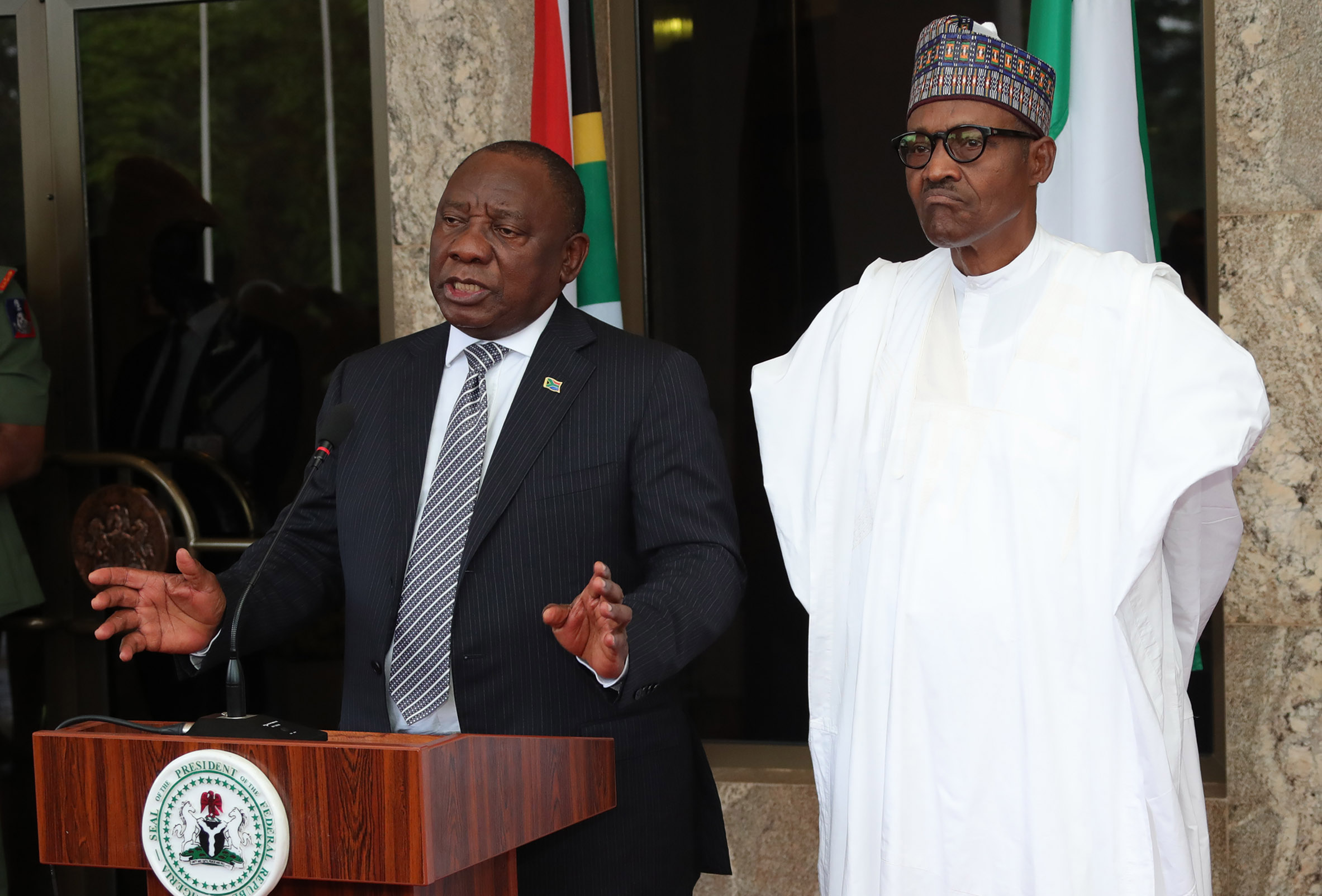PRESIDENT BUHARI RECEIVES SA PRESIDENT RAMAPHOSA 4A. PRESS BRIEFING R-L; President Muhammadu Buharichats with the President of South Africa, Mr Cyril Ramaphosa during an audience with President Buhari at the State House Abuja. PHOTO; SUNDAY AGHAEZE. JULY 11 2018.
Before COVID-19 there was little love lost between Nigerian and South African nationals. Indeed, prior to official recognition of a pandemic, violence against Nigerian nationals residing in South Africa were at an all time high; attacks were regular and systematic.
There are few official records or facts and figures but it is estimated some 118 Nigerians have lost their lives since the outbreak of attacks back in the early 1990s. Additionally, millions of Randworth of property has been lost to arson and vandalism in general.
Reasons cited for violence
Ask a South African why they dislike the Nigerians, so much so, that some will resort to violence and you’ll hear a well worn refrain containing the following:
- They steal our jobs
- They take our women
- Nigerians are criminals
The South African Government is in a bit of a shambles to say the least. Post 1994 growth of the economy has severely weakened in recent years. The attacks on Nigerian and other foreign nationals from Somalia, Ethiopia, Malawi, Zimbabwe, Namibia, Zambia, Tanzania, Pakistan, Bangladesh and Mozambique and the escalating violence used by these nationals in retaliation, diverts attention from the economic reality.
The current outlook for the economy, even before COVID 19 was heard of, was in decline. The South African Government has shown a distinct lack of interest and prefers to issue platitudes after each episode of violence. Given that COVID 19 is now on the scene, there is evidence of increasing numbers of xenophobic attacks which looks likely to continue way in to the future. COVID 19 – an excuse to escalate violence against non nationals – is despicable.
Nigeria’s official response
The Nigerian government is equally uninterested, perhaps because there is little that can be done over the border of another nation. It may also be that there are few South Africans residing in Nigeria, therefore there isn’t any tit-for-tat retaliatory action taking place, and would at best be counterproductive. Nigeria has a weak bargaining hand regarding the attacks on its Diaspora as a result of this situation.
Nigeria points out that South Africa is unlikely to use force against its own citizens where violence is being perpetrated against non South African nationals. South African police do little if anything to curtail the attacks and this looks likely to continue. It further states that given that the youth unemployment youth rate of 56% in South Africa isthe main driving forces behind the violence. Little will change if the South African government is unable to reverse the burgeoning weakness in its economy.
Business relations
Nigeria has a powerful economy and is one of the most developed nations on the continent, albeit taking a hit at the moment as the demand for crude is at a 30 year low. Indeed, youth unemployment is very low compared to that of South Africa. The youth of Nigeria is mobile and engaged in the modern world in a way that South African youth is not. But Nigeria does have one thing in common with South Africa – an unhealthy, over dependent relationship with China.
Sub Saharan African nations are more beholden to China than is South Africa but this I believe will change over the course of the coming years. Nigeria, along with South Africa and other African nations will have to work more closely together, to enhance continental security as well as security within borders. Nigeria is well placed to provide leadership in moving forward, to help other nations engage more with the west and reduce dependency on China.
Cross border cooperation
In contrast to the many Nigerians residing in South Africa, there are few Nigerian businesses in South Africa; those which are present are small, in the main informal predominately SMEs. However, the opposite is true of South African business interests in Nigeria, with many corporate structured, multinational South African businesses operating in Nigeria. So, contrary to the perceived wisdom, South Africa has a lot more to lose should Nigeria begin to flex its diplomatic muscle.
Should Nigeria flex its diplomatic muscle, South African operations in Nigeria could be made to suffer by way of cascading reductions in national income and reduced jobs. South Africa would be worst hit if relations deteriorate further. A belligerent relationship between the two is not the best route forward for these two nations, arguably the two most advanced nations on the continent.
The only real loser should this scenario open up would be South Africa. The SA Rand would ultimately take a big hit which would drive up inflation and worsen the economic outlook in general, given its business exposure in Nigeria.
Bucking trends
Not that all businesses in South Africa would be affected by a cooling of diplomatic and business relations. The South African online casino industry is bucking the national trend for example, as too is the export of rare earth, precious metals such as gold and silver and precious stones. Likewise, Nigeria has much to offer South Africa by way of tech and engineering expertise. There is the potential for a shared, golden future if only the current leadership would grasp the oppoertunity.
South Africa and Nigeria relationsbenefitted by way of a state visit by President Jacob Zumain 2016, hosted by the then new Nigerian president, MuhammaduBuhari. It was a significant step forward at the time and heralded a new direction for both countries. However, in the intervening years the relationship has not progressed as was hoped for, the reasons too complicated and intertwined to go into detail here.
Future relations
However, the future relationship between these two nations could take a new and positive direction. It is often said that out of diversity new opportunities present themselves. COVID 19 does not discriminate between nations. The fact that this virus strain originated in China and that nation’s leaders have taken the belligerent stance of protesting innocence while at the same time covering its tracks is reprehensible.
This is one of those opportunities where the leaders of Nigeria, South Africa and other nations on the continent could put their heads together and forge a new future of co-operation, where differences can be exploited for the common good, rather than the opposite which has no future at all and is counterproductive to all concerned.






